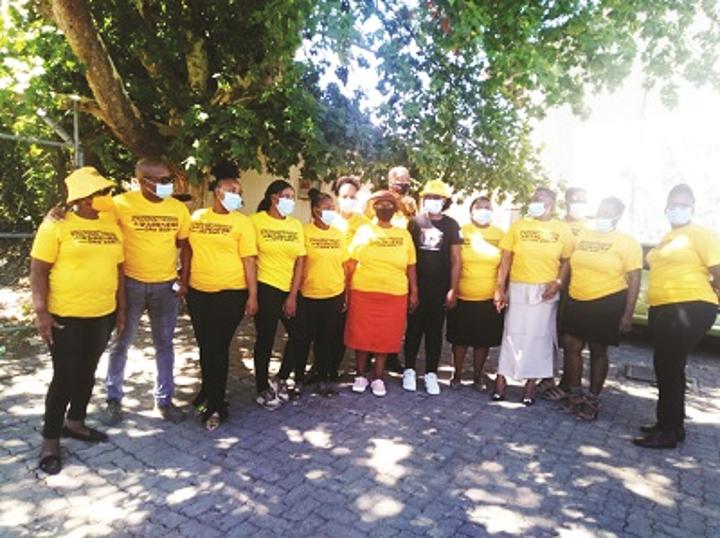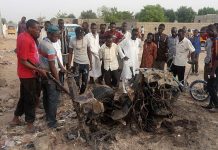Africa-Press – Lesotho. She-Hive lead the international endometriosis day celebration for the first time in the country, under the theme ‘Beyond Period Pains, A healthier life, A happy life’.
The day is annually celebrated on March 10th. As studies have indicated, at least one in ten women has endometriosis. “World-wide an estimated 172 million women suffer from it
and 300 000 of them eventually succumb to related complications where the organs get adhered together which is the final stage of disease”. Speaking at the celebration She-Hive Psychosocial
Support Officer ‘Malijo Baji said the commemoration is intended to educate the nation and make awareness of the disease. She said She-Hive is mandated to
stand-up for women and children’s human rights, particularly against violence or abuse and to encourage those affected to speak freely to ultimately decrease
violence statistics in Lesotho. She described endometriosis as a disorder in which tissue similar to the tissue that forms the lining of uterus grows outside of the uterine cavity, she said it occurs when endometrial tissue
grows on ovaries, bowel, and tissues lining your pelvis and it is unusual for endometrial tissue to spread beyond your pelvic region. Baji shared that she has a 13 year-old daughter who
has endometriosis. “We discovered this in 2020 last year. When my daughter was four years she started having uncontrollable nose bleeding that could last for
two weeks, she was often sent back home from school because of a severe nose bleeding and when taking her to the hospital a doctor or a nurse would stare at
me surprised of a parent bringing a child for a mere nose bleeding. I took her to different hospitals without any help, some doctors said she had clotting
disorder and treatment was given but nose bleeding did not stop,” she explained. She extended that when the daughter was 10 years – in her menstrual stage, during her periods, blood would come out from the mouth,
ears and she would have more nose bleeding. She said they only knew last year that she had endometriosis, which cannot be cured, rather controlled and she
said the medication is very expensive. Also speaking at the celebration Endometriosis Activist Makena Setho Letsie said she is an endometriosis survivor.
She appreciated She-Hive family for what it has done. “I never expected that my lamentations on print and social media about this deadly disease would
eventually reach a sympathetic ear. At the time, I had reached a point of despair and my only solace when pain was wreaking my body was to communicate more
about endometriosis,” she stated. She stated that she considers She-Hive a champion. “It is only recently when they approached me to partner with them in educating people
about endometriosis and abuse levelled against its victims by various individuals within the society, including medical practitioners. These forms of abuse vary
in severity, but are more painful when perpetrated by those from whom assistance is expected,” she said. Letsie said it is her sixth year after first having
been diagnosed with endometriosis, which in layman’s terms, is the growth of tissues on the outside of the womb. She stated that this disease has four
stages, the first of which is normally mistaken for ordinary period pains by the majority of people. “The other myth perpetrated is that the pains are selomi (severe period pains) and would
eventually fail to conceive at all, leading to the stigma associated with barren women in our society. Experience has shown that this may also lead to dissolution
of marriages, non-attendance of work or school due to the pain as merely getting out of bed becomes a burden. Employers get frustrated with constant absenteeism and draw the mistaken conclusion that the concerned individual is
just lazy. Some school girls will ultimately fail to meet their educational requirements as they cannot cope when struck down by the affliction,” she explained.
She indicated that She-Hive offers support and education by disseminating information about endometriosis, thus assisting in the eradication of abuse at the workplace, schools, health centres and other
places where such occurrences have taken place and she requested assistance from Non-governmental Organization (NGOs), businesses, medical practitioners
and the government for this disease. Letsie explained that she was informed that her fallopian tubes, ovaries and uterus are adhered together in 2017, “I had given
up hope and it was only through the help I got from Dr Mchaki from Queen Mamohato Memorial Hospital that I was eventually healed. Before then I had consulted a number of local gynaecologists all of whom failed to properly
diagnose my affliction. Like studies indicate as the norm amongst women, I was only able to self-diagnose after researching over the internet. When I next
consulted a gynaecologist, I made a specific request to be tested for endometriosis. Then she was unsympathetic to my cause and mocked me by suggesting that since I was able to diagnose myself, I should also prescribe
treatment. It was this kind of abuse that prompted me to have the courage to boldly speak of the disease,” she stated. She highlighted that the endometriosis leads to misperceptions
in others, often wrongly concluding that the victim is either lazy or selfish as the disease is often accompanied by unexplainable mood swings caused by
hormonal imbalance. She urged the nation to give all assistance to the victims of the disease and offer counselling to their families since taking care of a person suffering from endometriosis is in itself a traumatic event.
“No sister should suffer alone, endometriosis is a monster but together we will fight it,” she stated.
For More News And Analysis About Lesotho Follow Africa-Press






